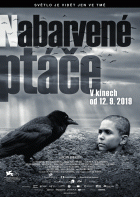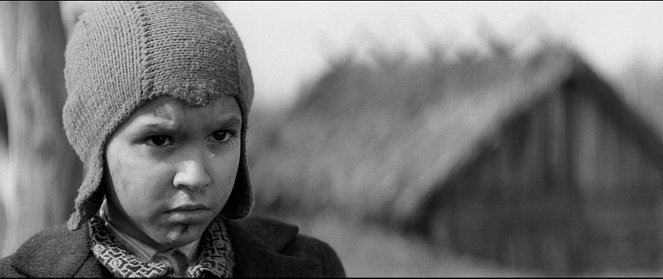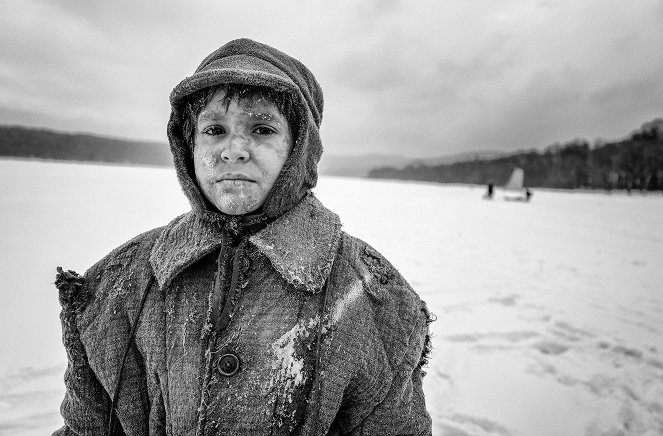Directed by:
Václav MarhoulScreenplay:
Václav MarhoulCinematography:
Vladimír SmutnýCast:
Petr Kotlár, Udo Kier, Michaela Doležalová, Zdeněk Pecha, Lech Dyblik, Jitka Čvančarová, Stellan Skarsgård, Harvey Keitel, Julian Sands (more)VOD (1)
Plots(1)
Trying to protect their child from the mass extermination of Jews, a Jewish couple sends their son to a relative in the countryside somewhere in Eastern Europe. However, the boy's aunt dies unexpectedly and the child is forced to set out on a lone journey through the wild and hostile world governed only by local rules, prejudices and superstitions. When the war ends, his fight for physical survival is replaced by a different kind of a fight. A battle he may not even be aware of, a battle with himself, a battle for his soul, his future... (Bioscop)
(more)Videos (4)
Reviews (11)
This film is saved by its black-and-white cinematography, framing and lighting, as well as by the depiction of the era with the right set designs and costumes. The narrative structure, however, is completely monotonous, devoid of any dramatic arc, artistic symbolism, more sophisticated editing techniques and internal emotional development, which could have been at least partially provided by (unfortunately completely absent) music. The Painted Bird misses most of what this type of film needs. The characters have well-chosen faces, but they only appear for a few minutes, barely speak and give nothing to the film. Their ugliness just contributes to the premature loss of the boy’s innocence in a nasty environment. And we come to understand that this loss is the point of the whole film only in the last few minutes, after almost three hours of monotonous stacking of the similarly looking and sounding episodes on top of each other.
()
The Painted Bird is undoubtedly an ambitious filmmaking project eyeing festival awards, as evidenced by its strong theme and international cast. I welcomed the black-and-white visuals, which (as was once the case with Psycho) reduced the violence and atrocities presented by the absence of colour. I was intrigued by the episodic nature of the film, in which the young and initially innocent child protagonist meets various characters on his 'journey home' who influence, mark or corrupt him in different ways. By Czech standards, this is without question a supremely raw film featuring pervasive violence against humans and animals and an inhospitable landscape full of suffering, hopelessness and sadness. Of the individual episodes, the ones that stick out in my mind the most are those with the shameless Jitka Čvančarová, the transport of the Jews and the raid on the village. Although the film is nearly three hours long, it went by really fast in the cinema. As noted, the film lacks music alongside the colours - unless you counts the church scenes and the subtitles – which is a bit of a shame, as there is little dialogue and the music could have filled in and enhanced these quiet spots.
()
Before the premiere, I had some doubts about whether the director was capable of handling a demanding and controversial subject. He didn't embarrass himself and instead brought out the best of himself and his vision is definitely worth seeing in the movie theater, which cannot be said about the overwhelming majority of Czech films. Marhoul managed the production perfectly. A film with such a big budget and a concentration of top-notch film specialists and significant foreign actors has been missing from Czech cinema for a whole decade and will probably be missing again for many years to come. The Painted Bird does not represent a trend or a glimpse of better times - it is a solitary work that nothing can follow, and at most, it can serve as a positive example for future visionaries. Marhoul has seen a lot and is not afraid to make use of it. The great camera work by Vladimír Smutný, the black and white material, and the division of the film into chapters reference Marketa Lazarová, and Marhoul consciously build on Come and See by involving Aleksei Kravchenko; cinephiles will surely find many other references, be it to the work of Jan Němec or other classics. The problem is that, despite all his efforts, Marhoul lacks something substantial to become a world-class filmmaker. He is unable to work with the pace and rhythm of the film and he is monotonous and repetitive. My daughter, who accompanied me, admitted after the screening that she was perfectly tuned into the film in the first ten minutes, only to realize with horror that she had to endure another nearly three hours of the same thing. If the director had shortened the film by half an hour, nothing would have changed in its essence and any viewer without knowledge of the source material would not have noticed. The Painted Bird is a sequence of beautiful film images that I approvingly nod my head at, but they evoke almost no emotions in me (if they do, then it is in inappropriate places. The torture, rape, and perversion sometimes reach the point that even the famous Marquis de Sade would find erotic pleasure in them. I had fun during the scenes of the two insatiable nymphomaniacs, but otherwise, it's not what the director had in mind.) A film full of tragedy and violence should completely crush me emotionally - with Volhynia, Come and See, or Nanking, that eventually happened. Not here, though. The main character goes through hell with the same absent expression, and the viewer cannot empathize with his thinking. More dialogue is missing, as well as depth. I feel like a member of an inventory commission who checks off item after item, one shot after another, and thinks about how nicely the director, as the chairman of the commission, prepared it for him... Sometimes I pause, for example when I watch the scene of a village being massacred by collaborating Cossacks, while the Red Army is attacking them from behind. In their situation, I would have completely different worries... In my opinion, Marhoul somewhat overestimated his abilities, but I consider four stars as a fair share of encouragement that Czech cinema desperately needed. Overall impression: 70%.
()
(less)
(more)
In terms of technical aspects, filmmaking and production values, Marhoul's masterpiece is a film of world-class level. Considering what has been produced in our country for the last 30 years, considering how miserable it is, this film has absolutely no comparison and the whole Czech post-revolutionary cinema is following it with its tongue hanging out like a exhausted dog. But I have one problem with it, or rather with its source material. The reason it didn't even tickle me emotionally at all is the fact that I didn't believe the sincerity of the message. You know, Jerzy Kosinski was a bit of an exhibitionist. He loved the spotlight, he loved to be talked about, and he just kind of showed off in his flagship work. The film commendably doesn't try to shock at all costs, rather it keeps a low profile, but it couldn't leave out some key scenes. So here too, as in the book, they are playing for effect. We see gouged eyeballs rolling on the ground, rape with a bottle, sex with an animal (but it should be noted that the camera takes it as subtly as possible) and even the restrained scene with the sniper and the cruel disposal of the paedophile is actually playing for effect in a way. Nothing happens naturally, I just didn't believe it, and emotionally it left me cold. Kosinski (and therefore the film) took a stereotypical approach to female characters, the two major female characters are both sexually disturbed aggressive nymphomaniacs, but at least he left the auntie out of it (big smiley face). Okay, I just have a big problem with the book, but not with the film in principle. Anyway, that cinematography! It’s world-class, really world-class. Every shot is thought out to the smallest detail, the beautiful long-shot compositions (in the bottom shot of Čvančarová walking naked in forest meadow you can clearly see Marhoul's inspiration from Alexandria in Marketa Lazarová) alternate with interior shots where it’s a joy to watch the play of light and shadow, simply beautiful. In fact, it wasn't until the end that I realized that there wasn’t any music and yet it didn't matter. That is also an art, to tell a story only in pictures, and here I give Marhoul a thumbs up. Aside from the final "chapter" when the boy gets to the civilized world and the narrative gets a bit bogged down and tedious, the film flew by very quickly. The pace is slow but engaging, so the three hours felt like an hour, and that's also a good report card for Marhoul. I'm glad I watched it, but I'm also glad I'm clear about which book I don't want in my collection PS: But I'm gonna take a crack at Marhoul anyway. He openly acknowledges Klimova's Come and See as a source of inspiration, also thanks to the presence of Alexei Kravchenko in one of the smaller roles. But when I compare little Kravchenko and Petr Kotlár, it's like heaven and smoke. At the end of Klimov's film, Kravchenko is a little old man, a boy with grey hair on whom the hardships of the war were indelibly and forever etched. Kotlár, in contrast, is so pudgy at the end, his face shows no hint of any hardship, he might as well sign up for some child modeling. So here I had a big problem with authenticity and the assurance that Come and See is simply on another weight category; in boxing terminology a Russian heavyweight vs a Czech Welterweight :o)
()
(less)
(more)
Ideally, Czech cinematography should have a big, ambitious film like this at least a couple of times a year, so one The Painted Bird wouldn’t get such an aura. But we don’t have that and with this work Marhoul is objectively several streets head of any recent Czech competition, and they simply can’t catch him. A great and stylish film, world-class. I didn’t enjoy it enough for a five-star rating because it’s not really possible to “enjoy” it. It is exhausting, rather. But a well earned four starts, without any doubt. Now, to create a media aura around this film as if it was some sort of exploitation war horror movie is incredibly absurd. Sure, there are some horrible and monstrous things, but Marhoul approaches them with a lot of decency, with chastity almost. And if the hysterical responses from Venice are anything to go by, it's just that the snobs from these big festivals like to fall into cheap headlines ... and that crap will last.
()



Ads